A few weeks ago, the race route of the Tour of Spain 2016, the Vuelta a España 2016, has been officially presented in Santiago de Compostela.
The 71st edition of the Vuelta a España, which will start on 20 August 2016 from the province of Ourense will have a total of 3,277 kilometers across 16 Spanish provinces, but also in the French Pyrenees, with a finish on top of the Col de l'Aubisque!
No less than 12 high mountain stages will be surrounded by 7 flat stages and 2 time trial stages in a race which, as usual, mainly concentrates on the northern part of Spain.
The Tour of Spain 2016 race route in detail
CONTINUE READING AFTER THIS ADVERTISEMENT
1/ Saturday 20 August 2016 - Ourense termal. Balneario de Laias > Parque Náutico Castrelo de Miño - team time trial - 29.4 km
The 71st edition of the Vuelta a España will start in the province of Ourense and to be more precise, from its capital which carries the same name, for a team time trial on a completely flat race route over a distance of 29.4 kilometers. The rider who crosses the finish line first in the fastest team in this collective effort will have the chance to carry the first red leader's jersey for the general classification.Hereunder you'll find the profile of this 1st stage of the Vuelta a España 2016:
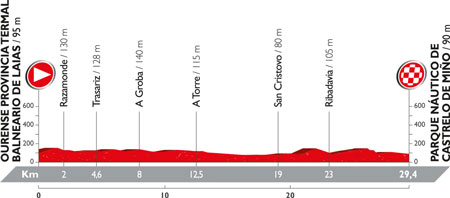
2/ Sunday 21 August 2016 - Ourense capital termal > Baiona - 159 km
Again starting in the city of Ourense, the riders will go off for the 2nd stage, the first stage in line of this Tour of Spain 2016. On the 159 kilometers long race route of this stage, towards Baiona, the riders will find only one difficulty, of the 2nd category (the Alto Montouto, ^ 800 m) right in the middle of the stage. Most logically this should thus not prevent the sprinters to battle for the stage win and potentially to be able to put on the red jersey after this second stage!Hereunder you'll find the profile of this 2nd stage of the Vuelta a España 2016:
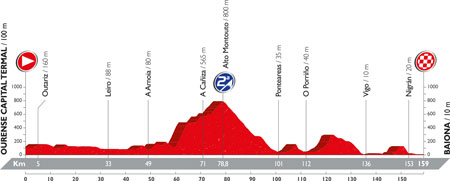
3/ Monday 22 August 2016 - Marín > Dumbría - Mirador de Ézaro - 170 km
This third stage, starting in Marín, will have a first half which will be completely flat, before the riders start the climb of the Alto Montes de Carnota (2nd category, ^ 535 m) and a bit further the Alto das Paxareiras (2nd category, ^ 500 m) and finally the final climb which the Tour of Spain discovered for the first time as a stage finish in the 2012 edition, the Mirador de Ézaro (3rd category, ^ 275 m) at Dumbría, and this "wall" left quite impressed and this might again be the case on Monday 22 August!Hereunder you'll find the profile of this 3rd stage of the Vuelta a España 2016:
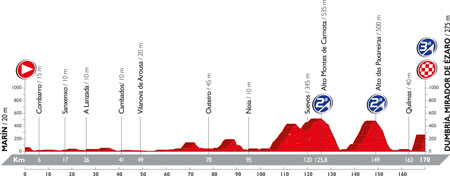
4/ Tuesday 23 August 2016 - Betanzos > San Andrés de Teixido - 161 km
The 4th stage will start in Betanzos and after 16 kilometers, the riders will get on a hilly part of this stage, with the climb of the Alto da Serra Capela (3rd category, ^ 405 m) and of the Alto Monte Caxado (3rd category, ^ 685 m). What follows in this stage will be a bit more flat, down to about ten kilometers from the finish, when the final climb towards the Mirador Vixia de Herbeira (2nd category, ^ 595 m) in San Andrés de Teixido shows up under the wheels of the Vuelta a España 2016 riders. This mountain top finish has never before been a stage finish in the Vuelta.Hereunder you'll find the profile of this 4th stage of the Vuelta a España 2016:
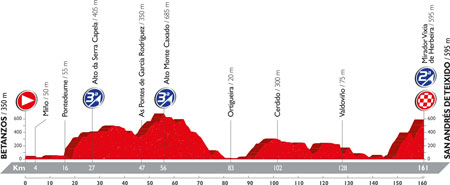
CONTINUE READING AFTER THIS ADVERTISEMENT
5/ Wednesday 24 August 2016 - Viveiro > Lugo - 170 km
The first 60 kilometers after the start of the 5th stage of the Tour of Spain 2016 in Viveiro are flat, but the terrain then becomes more difficult, with the climb of the Alto do Picato (2nd category, ^ 650 m) and of the Alto do Miño (3rd category, ^ 600 m). The peloton then arrives on the final circuit around the finish in Lugo where they'll cross the finish line twice, the second time most probably for a bunch sprint!Hereunder you'll find the profile of this 5th stage of the Vuelta a España 2016:
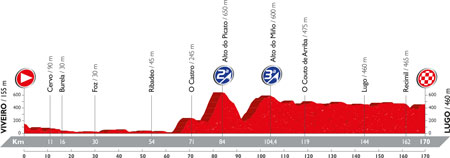
6/ Thursday 25 August 2016 - Monforte de Lemos > Luintra - Ribera Sacra - 163 km
In the 163 kilometers which separate Monforte de Lemos from Luintra, the riders will find two difficulties of the 2nd category in the second half of the stage, the Alto Alenza (^ 820 m) and the Alto Mirador de Cabezoas (^ 835 m) which might give one or more adventurers the occasion to battle for the stage win or at least thin out the peloton. In the last kilometers, the road is not wide, along the Sil river acorss the Ribeira Sacra, which will probably give some nice TV images.Hereunder you'll find the profile of this 6th stage of the Vuelta a España 2016:
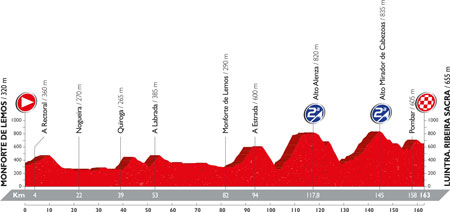
7/ Friday 26 August 2016 - Maceda > Puebla de Sanabria - 158.3 km
A slightly hilly stage awaits the riders the day before the first mountain stage, starting in Maceda. The winding race route contains the climbs of the Alto de Guimarás (3rd category, ^ 740 m), the Alto de Fumaces (2nd category, ^ 890 m) and the Alto de Padomelo (3rd category, ^ 1.335 m). After the descent of this last climb, the finish line will be drawn on a flat part in Puebla de Sanabria.Hereunder you'll find the profile of this 7th stage of the Vuelta a España 2016:
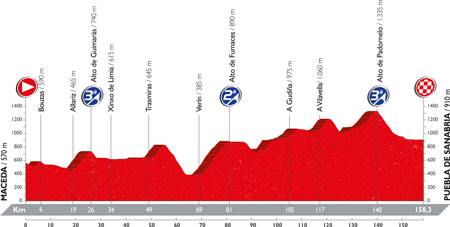
8/ Saturday 27 August 2016 - Villalpando > La Camperona - Valle de Sabero - 177 km
This Saturday, the 8th stage will thus be the first mountain stage, starting in Villalpando. Before the final climb, the riders will however not find any difficulties on their road and after the first visit of the finish on La Camperona in 2014, we'll thus again see the explanation between the favourites at the finish of this first mountain stage of the Vuelta a España 2016!Hereunder you'll find the profile of this 8th stage of the Vuelta a España 2016:
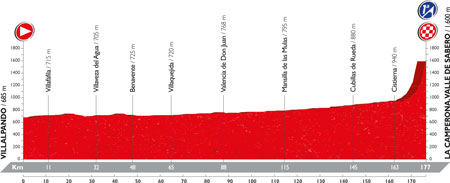
CONTINUE READING AFTER THIS ADVERTISEMENT
9/ Sunday 28 August 2016 - Cistierna > Oviedo - Alto del Naranco - 165 km
Starting in Cistierna, the riders know that there'll be another mountain top finish in Oviedo but they'll also know that it'll be less difficult than the day before. Before they get there however, they'll climb the Puerto de Tarna (3rd category, ^ 1.485 m), the Alto de Santo Emiliano (3rd category, ^ 515 m) and the Alto de la Manzaneda (3rd category, ^ 385 m). The final climb towards the Alto del Naranco is a 2nd category difficulty up to an altitude of 600 meters.Hereunder you'll find the profile of this 9th stage of the Vuelta a España 2016:
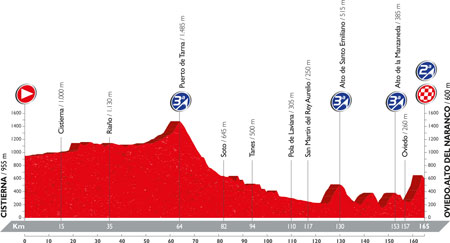
10/ Monday 29 August 2016 - Lugones > Lagos de Covadonga - 186.6 km
Another mountain stage with mountain top finish awaits the peloton this Monday 29 August, but this time it'll be much more serious with a hors category finish. The start of this stage will be in Lugones and it'll start by following the coast line to start off easily before the peloton attacks the first category climb of the Alto del Fito (^ 570 m). After the descent of this climb, the riders will continue with the final climb towards the Lagos de Covadonga (^ 1,110 m, hors category).Hereunder you'll find the profile of this 10th stage of the Vuelta a España 2016:

R1/ Tuesday 30 August 2016
On this Tuesday 30 August, the riders will enjoy the first rest day of this Vuelta a España 2016.11/ Wednesday 31 August 2016 - Colunga - Museo Jurásico > Peña Cabarga - 168.6 km
After this first rest day, the 11th stage will start in Colunga and after 159 flat kilometers, the final part of this stage will go uphill towards Peña Cabarga (545 m, 1st category).Hereunder you'll find the profile of this 11th stage of the Vuelta a España 2016:
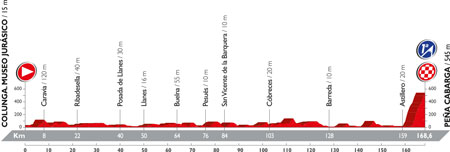
CONTINUE READING AFTER THIS ADVERTISEMENT
12/ Thursday 1er September 2016 - Los Corrales de Buelna > Bilbao - 193.2 km
On this first day of September, the Tour of Spain arrives in the Bask country. After the stage start in Los Corrales de Buelna and 35 kilometers in the race, the riders will start the climb of the Puerto de Alesas (^ 615 m, 1st catégorie) and a bit further they'll get on a 3rd category climb, the Alto de La Escrita (^ 425 m).Towards the end of the stage they'll fin don their route a double climb of the Alto del Vivero (3rd category, ^ 400 m) and its summit will be at about 13 kilometers from the finish at the second visit.
Hereunder you'll find the profile of this 12th stage of the Vuelta a España 2016:

13/ Friday 2 September 2016 - Bilbao > Urdax-Dantxarinea - 212.8 km
The longest stage of this Vuelta a España 2016 will start in the city where the stage of the day before finished, Bilbao. 212.8 kilometers will be on the programme on the way to Urdax-Dantxarinea and it's not only the length which will make this stage difficult but also its profile with no less than 6 difficulties of the 3rd category (Alto de Itxiar, Alto do Monto Igualdo, Alto Aritxulego, Puerto de Agiña, Puerto de Lixaiçea and after a short visit of France, the Collado de Urbía) and one of the second category (Puerto Otsondo) of which the top will be reached at only 5 kilometers from the finish. All these difficulties will most probably thin out the peloton.Hereunder you'll find the profile of this 13th stage of the Vuelta a España 2016:

14/ Saturday 3 September 2016 - Urdax-Dantxarinea > Aubisque - Gourette (FR) - 195.6 km
Very quickly after the start of this 14th stage from Urdax-Dantxarinea, the finish city of the previous stage, the riders will cross the border with France and they'll have a heavy programme with three 1st category hills and a hors category final climb. These respective climbs will be the Col Inharpu (^ 1,080 m), the Col de la Pierre Saint-Martin (^ 1,520 m) and the Col de Marie-Blanque (^ 1,015 m) before the final climb towards the Col d'Aubisque (^ 1,705 m).Hereunder you'll find the profile of this 14th stage of the Vuelta a España 2016:
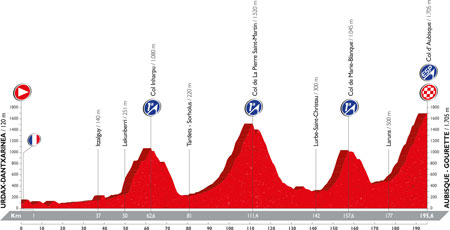
15/ Sunday 4 September 2016 - Sabiñánigo > Sallent de Gállego - Aramón Formigal - 120 km
The 15th stage will be a short stage, the shortest of this Vuelta a España 2016 except for the last one, with a distance of 120 kilometers starting in Sabiñánigo. This stage is perfect for a breakaway to get away in one of the two difficulties on the way or in the final climb. The top of the first difficulty, of the 3rd category, will be reached after 43 kilometers, the Alto Petralba (^ 1,250 m) and about thirty kilometers further, the riders will already be in the climb of the Alto de Cotefablo (2nd category, ^ 1,400 m). The final climb will be the hardest one, of the first category, up to Sallent de Gállego - Aramón Formigal (^ 1,800 m).Hereunder you'll find the profile of this 15th stage of the Vuelta a España 2016:
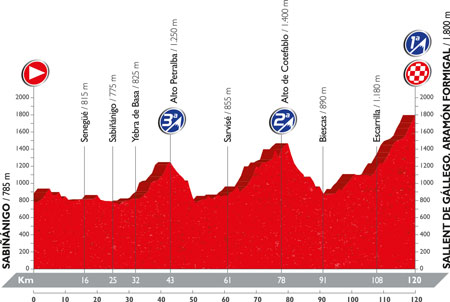
CONTINUE READING AFTER THIS ADVERTISEMENT
16/ Monday 5 September 2016 - Alcañiz > Peñíscola - 158 km
The first stage of the last week, the day before the second rest day, there will be 158 difficult kilometers on the programme starting in Alcañiz. Even though the road goes up right from the start, there will be only one difficulty in the race route, the Alto Morella of the 3rd category (^ 960 m) and about ten kilometers further, the race route continues downhill over 50 kilometers before a final part of about 20 kilometers flat until the finish in Peñíscola.Hereunder you'll find the profile of this 16th stage of the Vuelta a España 2016:
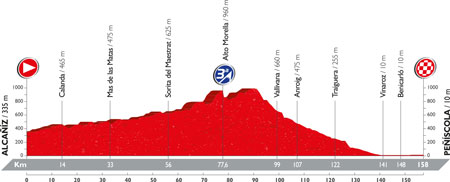
R2/ Tuesday 6 September 2016
After these 16 stages, and thus one week of non stop racing, the riders will enjoy the second rest day, the last one of this Vuelta a España 2016.17/ Wednesday 7 September 2016 - Castellón > Llucena - Camins del Penyagolosa - 173.3 km
The day after this rest day, a stage with its never before visited finish, uphill, will probably be quite impressive. Indeed, starting in Castellón, the riders will thinjk about the three 2nd category climbs but most of all the first category climb which will finish off this stage towards Camins del Penyagolosa in Llucena. This will be a climb with parts of over 21% and an average steepness of 12.9%!The other difficulties they'll have to climb are the Alto del Desierto de Las Palmas (^ 420 m) which will have its top after 16 kilometers, the Alto de la Sarratella (^ 840 m) after 79 kilometers and the Puerto de Benasal (^ 975 m) after 106 kilometers.
Hereunder you'll find the profile of this 17th stage of the Vuelta a España 2016:
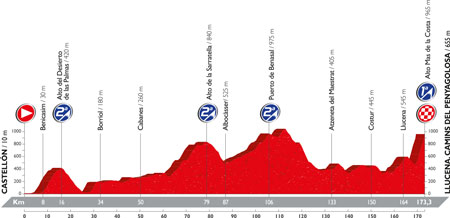
18/ Thursday 8 September 2016 - Requena > Gandía - 191 km
The organisor of the Tour of Spain qualifies this 18th stage between Requena and Gandía as a flat stage and as the forelast chance for the sprinters (with the last stage of course). It is however slightly hilly and will have one referenced difficulty, the Alto del Pelegrin (2nd category, ^ 1,085 m), but indeed, at about 130 kilometers from the finish it'll most probably not prevent the sprinters to battle for victory in this stage! A breakaway could however come bother their plans ...Hereunder you'll find the profile of this 18th stage of the Vuelta a España 2016:
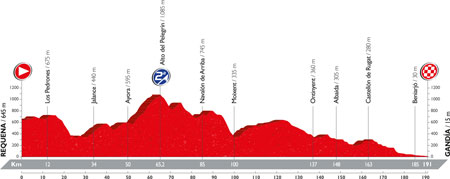
CONTINUE READING AFTER THIS ADVERTISEMENT
19/ Friday 9 September 2016 - Xàbia > Calp - individual time trial - 39 km
At two days from the finish in Madrid, this 19th stage between Xàbia and Calp will take place as an individual time trial. The stage is almost completely flat and will thus please the specialists of the discipline and they could use it to secure or even improve their ranking in the general classification.Hereunder you'll find the profile of this 19th stage of the Vuelta a España 2016:
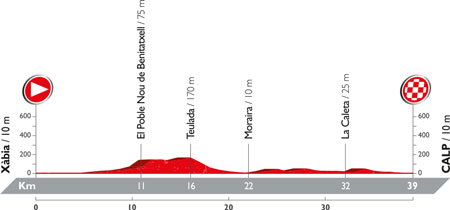
20/ Saturday 10 September 2016 - Benidorm > Alto Aitana - Escuadrón Ejército Aire - 184 km
After this solo test, this mountain stage could still influence the general classification of this race in another way! Indeed, 4 difficulties, three of the 2nd and one of the 3rd category, distributed over the distance of this stage will add up with the final climb which is hors category and on which we'll see the final explication between the leaders of the race the day before the "ceremonial" stage the next day.The stage will rapidly start off with the climb of the Coll de Rases (2nd category, ^ 630 m) and just after the descent, the riders will already get on the Alto de Ebo (3rd category, ^ 540 m) and a bit further the 2nd category climb of the Alto de Tollos (^ 830 m). Much further, the riders will find the Puerto de Tudons, a 2nd category climb with an altitude of 1,020 meters.
If these climbs didn't lead to a first selection, it'll most probably take place a bit further, because after the descent of the Puerto de Tudons, the peloton will start the final climb of 22 kilometers: 1,280 mètres altitude difference towards the top of the Alto Aitana with an average steepness of 5.72% (^ 1,510 m).
Hereunder you'll find the profile of this 20th stage of the Vuelta a España 2016:
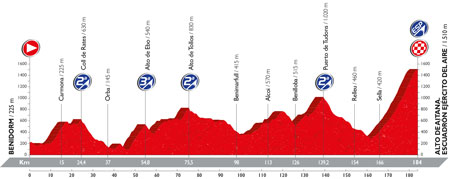
21/ Sunday 11 September 2016 - Las Rozas > Madrid - 102,5 km
This last stage of the Tour of Spain 2016, like the last stage of all Grand Tours, will probably not have much interest from a sports point of view, if it were only to know who will be the winner of the stage.For this stage, all riders and followers will have done a big transfer to get to the start in Las Rozas and less than 50 kilometers further they'll already cross the finish line in Madrid for the first time. The riders will still have to do another 9 laps on the local circuit of 5.9 kilometers before we know the winner of this stage however, a sprinter as usual.
Hereunder you'll find the profile of this 21st stage of the Vuelta a España 2016:
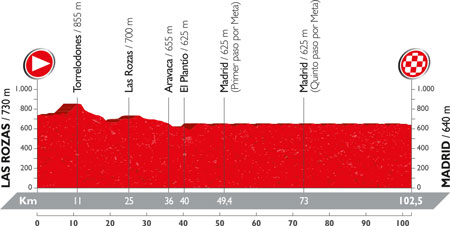
The overall map of the Tour of Spain 2016
Hereunder you'll find the overall map of the Vuelta a España 2016: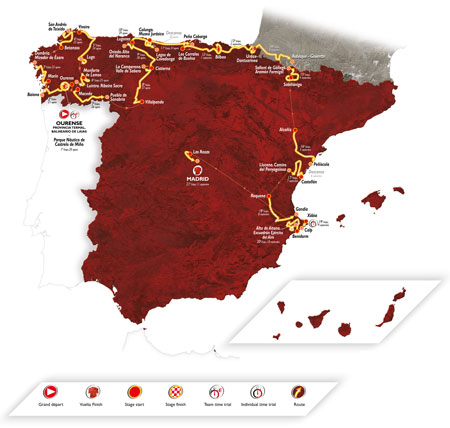
The presentation video of the Tour of Spain 2016
The Vuelta a España 2016 race route has of course also been presented in a video. Here it is:Vond u dit artikel interessant? Laat het uw vrienden op Facebook weten door op de buttons hieronder te klikken!
7 comments | 20394 views
this publication is published in: Vuelta a España | Vuelta a España 2016





 by marco1988 over
by marco1988 over
Bonjour Thomas,
Merci pour cette présentation.
Est-ce que le versant de la Pierre Saint Martin est le même que celui grimpé sur le Tour?
@ Dom
Ce n'est pas la Pierre St Martin qui sera emprunté mais le col du Soudet depuis St Engrace (versant ouest). Je ne sais pas pourquoi les organisateurs parlent de la Pierre Saint Martin. C'est sans doute plus vendeur suite au Tour 2015.
Après une édition 2015 dont on peut raisonnablement dire qu'elle fut un succès tant en spectacle qu'en prestige et en suspens, les organisateurs de la Vuelta ont donc décidé de capitaliser sur cette expérience en... effaçant tout ce qui avait fait de 2015 un tour si captivant jusqu'à la fin. Retour aux courses de côtes à n'en plus finir, pas d'arrivée en vallée, un classique du genre pour Javier Guillen. Les sprints en côte sur 500m plutôt que les grandes manoeuvres d'Astana qui condamnent le porteur du maillot Rojo. Bonjour tristesse.
Guillen semble justifier ce choix par la présence des JO de Rio qui, selon lui, dissuaderaient les grands noms du peloton de venir sur les routes ibériques si le parcours est trop dur. Il me semble quand même que sur ce point, Guillen confonde moins dur et inintéressant. Quel dommage de voir la Vuelta délaisser les innovations qui ont fonctionné en 2015 pour revenir à ce qui ne donnait rien de bon. Espérons que l'absence de JO en 2017 permette de retrouver cette audace qui m'a tant plu.
C'est vrai que le parcours de 2015 était le plus intéressant de ces dernières années. Notamment cette dernière semaine assez atypique. Tout n'était pas parfait mais il y avait clairement du mieux. Le parcours de 2016 est vraiment moche en comparaison.
@ Porcupine : plus difficile que le versant emprunté par le Tour non?
Sinon, en 2012, le tracé avait été décrié, notamment sur ce blog, et finalement, la course avait été splendide, donc on verra bien...
@ Dom
Pour moi c'est kif-kif entre le versant depuis Arette et celui depuis Saint Engrace. Une dizaine de bornes à 8-9% de moyenne. Ca restera dans les jambes pour le final ça c'est certain.
Bonjour à tous,
Vuelta dure (plus que l'année dernière peut-être même) mais ratée et décevante.
Comment peut-on revenir à des courses de côte de 5 km (sauf rares exceptions) alors que le parcours incertain du dernier tour avait été sympa à suivre ? A croire que le cyclisme-spectacle a définitivement disparu (l'excuse des JO ne marche pas vu que le parcours est intense avec 14 étapes difficiles).
Et puis cet empilement de bosses...
Heureusement qu'en bonne nouvelle on a le col d'Inharpu enfin emprunté : peut-être qu'ASO osera les petites routes basques pour un prochain tour si Unipublic lui montre la voie.